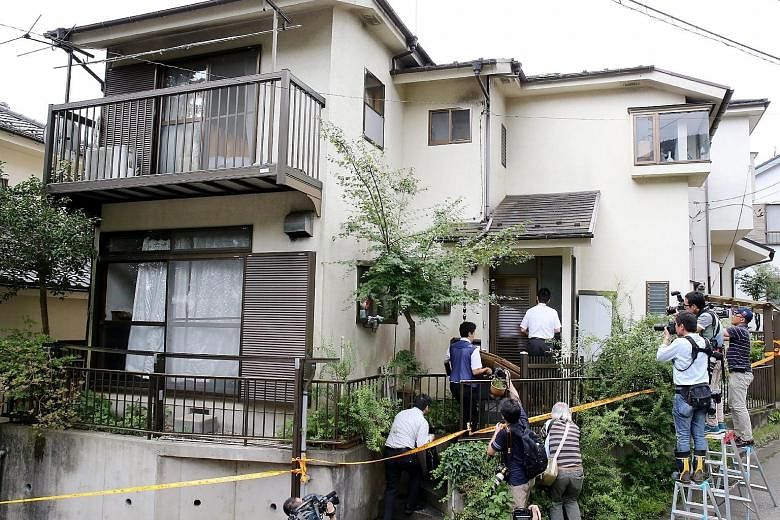SAGAMIHARA • Police yesterday raided the house of a 26-year-old man suspected of stabbing to death 19 people and wounding dozens of others at a facility for the disabled in a small town near Tokyo, in Japan's worst mass killing in decades.
About half a dozen plainclothes police officers entered the home of Satoshi Uematsu, a former employee of the facility, as reporters and television crews stood outside.
The two-storey dwelling is in the same neighbourhood as the Tsukui Yamayuri-En facility for the mentally and physically disabled where Uematsu had worked.
He had earlier been taken from a jail in Sagamihara, about 40km south-west of Tokyo, to the Yokohama District Public Prosecutor's Office in Kanagawa prefecture.
With a blue jacket draped over his head, he was escorted out of a police station into a waiting van before a crowd of flashing cameras. Footage broadcast on morning news showed him smiling broadly while inside the vehicle.
An official at the Tsukui police station where Uematsu was held after the attack declined to comment on the investigation, only confirming that he was being transported to prosecutors for questioning.
Uematsu, who gave himself up to the police on Tuesday after the attack, had said in letters written in February that he could "obliterate 470 disabled people" and gave detailed plans of how he would do so, Kyodo news agency reported.
He was involuntarily committed to hospital after he expressed a "willingness to kill severely disabled people", an official in Sagamihara told Reuters.
He was freed on March 2 after a doctor deemed he had improved and was no longer a threat to himself or others, the official said.
The killings have sparked debate on whether the system for involuntary commitment and aftercare has broken down, since Uematsu had previously made clear his intent to commit the crime.
"Involuntary commitment is done forcefully by the authorities... If the time period drags on longer than necessary, it becomes a serious violation of human rights," the Asahi newspaper said in an editorial on Tuesday. "However... there were warning signs before (this particular) incident."
It questioned if the treatment and follow-up care were sufficient.
The top-selling Yomiuri Shimbun daily called the case "appalling" and urged an investigation into the decision to release Uematsu from medical care.
"It is a matter of great regret for society to let such a serious stabbing incident happen," it said in an editorial which called for increased security at care facilities.
Japan has one of the lowest rates of violent crime in the developed world. Tuesday's killing spree is believed to be the nation's worst since 1938, when a man armed with an axe, sword and rifle went on a rampage that left 30 people dead.
Residents of the Sagamihara area, a largely rural, wooded valley where houses are interspersed with orchards and vegetable gardens, were left struggling to come to grips with the violence.
"There was no reason or benefit to this," said 82-year-old Yukiko Inoue. "He just killed them."
Local media said Uematsu has told police that he wants to apologise to bereaved families about the sudden loss of their loved ones, though he still justified what he did.
"I saved those with multiple disabilities," he told police, according to private broadcaster TV Asahi, citing investigative sources.
Uematsu broke into the care centre in the forested hills of Sagamihara in the early hours of Tuesday.
He reportedly tied up two caregivers before stabbing residents using a total of five knives - killing 19 and leaving 26 people injured, 13 of them severely.
He then turned himself in at a police station, carrying the bloodied knives and admitting to officers: "I did it." He reportedly also said: "The disabled should all disappear."
REUTERS, AGENCE FRANCE-PRESSE

